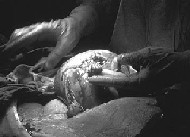Unborn mothers
Ethics groups and anti-abortion watchdogs reacted with horror on Tuesday to news that babies might be created using eggs from aborted foetuses.
 |
| A four month old foetus grabs the finger of a surgeon performing surgery |
Only a quarter of a century ago the first test-tube baby, Louise Brown, was born. Now scientists have raised another even more peculiar prospect – “unborn mothers”.
The notion that children can derive from human matter that has not itself been born sounds the stuff of science fiction.
But it has moved a step closer with research showing that it is possible to extract ovarian tissue from aborted foetuses for in-vitro fertilisation (IVF) treatment.
Scientists announced on Monday that they have been able to remove immature ovaries from four-month-old foetuses.
The theory is that they can then be stimulated in the test tube to go through the later stages of development before the creation of fully mature eggs, Israeli researchers said at a fertility conference in Madrid this week.
Fertility doctors say harvesting eggs might be a way to ease a worldwide shortage of women prepared to donate their eggs to help other women become pregnant.
Criticism
“This is grotesque even by the low moral standards of the IVF (in-vitro fertilisation) industry,” said Nuala Scarisbrick, trustee of the British anti-abortion charity Life.
The Christian charity CARE called the development “utilitarianism gone mad” and said it was ethically unacceptable.
The conference heard that Israeli and Dutch scientists had grown egg-laden tissue from seven aborted foetuses for up to four weeks — a technique already used to produce baby mice.
The foetuses from which ovarian follicles were harvested in the study were 22-33 weeks old, said Paul Tully of the Society for the Protection of the Unborn Child. “These are babies who would be viable with support,” he said.
Dr Tal Biron-Shental of the Meir Hospital-Sapir Medical Center in Israel told the European Society of Human Fertilisation and Embryology conference that the prospect was controversial, but she added: “Most probably in some places it would be ethically acceptable.”
Ethics
When a high-powered committee of ethicists considered this possibility in Britain during the early 1990s it took the view that any child created by such a procedure would not be able to come to terms with the idea of deriving from aborted foetal tissue.
However, it is clear that the increase in demand for a supply of healthy human eggs – which are not easy to “harvest” from even the most fertile women – is causing several groups of scientists around the world to explore the possibility of using aborted foetuses.
Françoise Shenfield, an ethicist at University College London and a former member of the Human Fertilisation and Embryology Authority, also voiced concerns about where this sort of research was leading.
“I would be very troubled by this not only for ethical reasons but for psychological reasons, because what is the public going to think about where the eggs come from?” Dr Shenfield said.
Roger Gosden, a leading American fertility specialist working at the Jones Institute in Norfolk, Virginia, said the ethical issues centre on the issue of informed consent – the foetus cannot give its consent.
Dr Gosden also questioned whether the research was necessary because he had demonstrated that it is possible to obtain ovarian tissue from adult women with the aim of culturing the follicles in vitro to produce mature eggs.